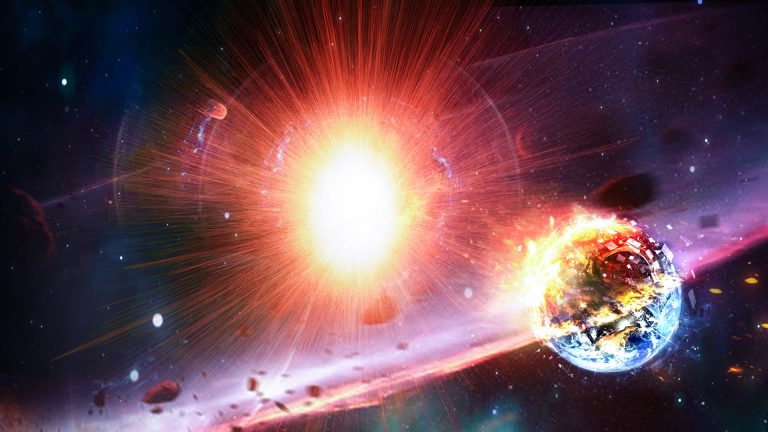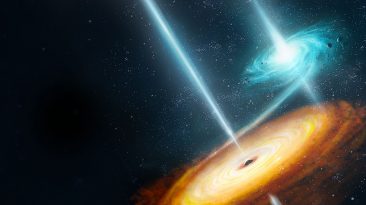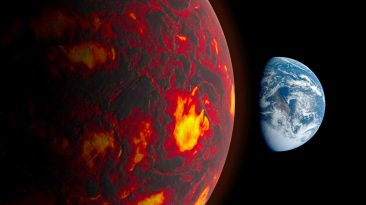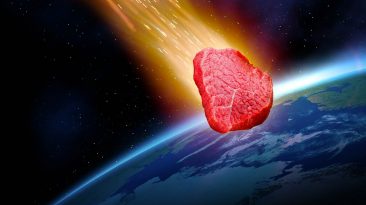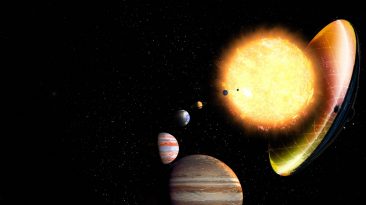As much as we love to blow stuff up here on Earth, no bombs or pyrotechnics could compare to the incredible force of nature’s biggest explosion, the supernova. As a star reaches its grand finale and explodes, what would happen to life on Earth if we were close by?
How far away from a supernova are we considered safe? Could anything survive its deadly radiation? What makes supernovae valuable to us?
Before you freak out, Earth is in a relatively safe patch of space called the Local Bubble. This peanut-shaped region of expanding gas in our Milky Way galaxy results from nearby supernovae explosions that occurred 20 million years ago.
These explosions helped shape our solar system, spreading gas, dust, and heavier elements like uranium and gold to Earth. Without these supernovae, we wouldn’t have any shiny gold bling or powerful nuclear reactors. So you can, quite literally, count your lucky stars.
Okay, but are we in danger of any nearby supernovae?
On average, a supernova will occur about once every 50 years in the Milky Way. Thankfully, there are no stars massive enough to become a supernova within 50 light-years of the Earth.
There is, however, one binary starry system within 159 light-years of Earth that could potentially put us at risk. Binary star systems are Type I supernovae. This happens in a tumultous dance between two stars, where matter is sucked from one star into another, typically a White Dwarf.
Eventually, the white dwarf explodes, resulting in an epic supernova. On the other hand, Type II supernovae occur when a star runs out of fuel, and some of its mass flows into its core.
Over time, the core will start to grow and get so heavy that it cannot withstand its gravitational force. And then, kablooey! The core collapses, and a supernova is born.
When these explosions occur, a powerful blast of radiation is spread throughout space that will kill anything within 50 light-years. To put this into perspective, our Solar System is only about two light-years wide. So the supernova’s blast would be the distance of 25 of our solar systems in a row.
If a supernova occured as close as 30 light-years away we’d have bigger problems than a pandemic on our hands. The intense blast of radiation would carry a massive influx of high energy neutrinos that would boil any living creature from the inside out. Hope you like your meals poached!
The entire Earth could be vaporized in just a fraction of a second if the supernova was close enough. The shockwave would arrive with enough force to wipe out our entire atmosphere and even our oceans.
The exploded star would grow brighter for about three weeks after the explosion, casting shadows even during the day. Even if life survived, the superheated gas from the supernova would emit deadly amounts of UV and gamma radiation. These rays would destroy the ozone layer, leading to the formation of nitrous oxide smog.
We would all have to go deep underground and embrace our new lives as mole people to escape the lethal radiation and poisonous atmosphere. Unfortunately, there would be an increase in mutations and deadly cancers. And to top it all off, our phytoplankton, which account for almost 50% of all photosynthetic activity on Earth, would die off.
Phytoplankton is vital to us and can absorb carbon dioxide from our atmosphere. Without it, we’d have a tougher time breathing. Global warming would accelerate even further beyond our control.
And as an essential food source at the bottom of the marine food chain, a lack of phytoplankton would result in sea creatures becoming extinct. And eventually, humankind would too.
So, like many What Ifs, almost everything dies. But there might still be a few lucky species of extremophiles that could survive the intense radiation.
After a couple of hundreds or thousands of years, the supernova would leave an impressive nebula in its wake. At the very least, we’d have a fantastic view in our night sky. Well, for those of us that can see.
Sources
- “What Is A Supernova?”. 2020. NASA.
- “How elements are formed”. 2020. Science Learning Hub.
- “Astronomers have spotted the most powerful supernova ever”. Crane, Leah. 2020. New Scientist.
- “What’s a safe distance between us and a supernova?”. 2020. earthsky.org.
- “What Is A Supernova?”. Thompson, Andrea. 2018. space.com.
- “Supernovae”. 2020. hyperphysics.phy-astr.gsu.edu.


